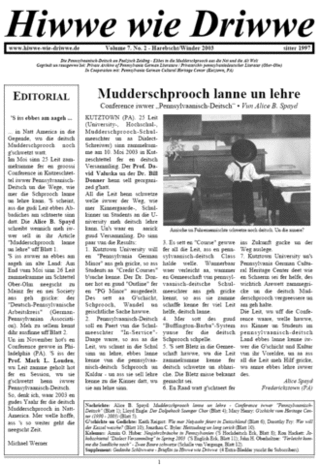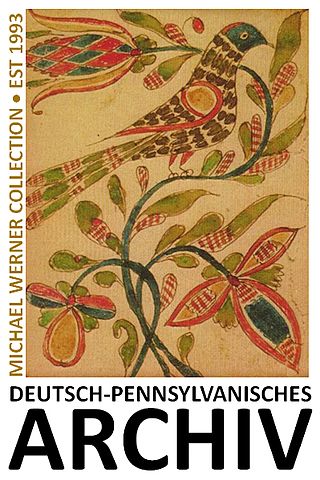
The Palatinate, or the Rhenish Palatinate (Rheinpfalz), is a historical region of Germany. Prior to World War 2, it was known as Rhenish Bavaria; as a state of the Holy Roman Empire, it was known as the Lower Palatinate (Unterpfalz), which designated only the western part of the Electorate of the Palatinate, as opposed to the Upper Palatinate (Oberpfalz). It occupies roughly the southernmost quarter of the German federal state of Rhineland-Palatinate (Rheinland-Pfalz), covering an area of 2,105 square miles (5,450 km2) with about 1.4 million inhabitants. Its residents are known as Palatines (Pfälzer).

The Pennsylvania Dutch, also known as Pennsylvania Germans, are a German cultural group native to Pennsylvania and other American states. They descend from Germans who settled during the 17th, 18th and 19th centuries, primarily from the Palatinate, but also from other German-speaking areas, such as Baden-Württemberg, Hesse, Saxony, and Rhineland in Germany as well as the Netherlands, Switzerland, and France's Alsace-Lorraine region.

Pennsylvania Dutch, sometimes referred to as Pennsylvania German, is a variety of Palatine German, also known as Palatine Dutch, spoken by the Pennsylvania Dutch: Old Order Amish, Old Order Mennonites, Fancy Dutch, and other descendants of German immigrants in the United States and Canada. There are possibly more than 300,000 native speakers of Pennsylvania Dutch in the United States and Canada.

Over 50 million Americans claim German ancestry, which makes them the largest single claimed ancestry group in the United States. Around 1.06 million people in the United States speak the German language at home. It is the second most spoken language in North Dakota and is the third most spoken language in 16 other states.

German Americans are Americans who have full or partial German ancestry. With an estimated size of approximately 43 million in 2019, German Americans are the largest of the self-reported ancestry groups by the United States Census Bureau in its American Community Survey. German Americans account for about one third of the total population of people of German ancestry in the world.

German Canadians are Canadian citizens of German ancestry or Germans who emigrated to and reside in Canada. According to the 2016 census, there are 3,322,405 Canadians with full or partial German ancestry. Some immigrants came from what is today Germany, while larger numbers came from German settlements in Eastern Europe and Imperial Russia; others came from parts of the German Confederation, Austria-Hungary and Switzerland.

The Pennsylvania Dutch Country, also called Pennsylvania Dutchland, simply the Dutch Country or Dutchland, and sometimes referred to as the Distelfink Country, is an area spanning the Delaware Valley and South Central and Northeastern regions of Pennsylvania.

The Fancy Dutch, also known as the Church Dutch, Gay Dutch (old-fashioned), or Church people, are the Pennsylvania Dutch who do not belong to the Plain Dutch Anabaptist churches. Unlike the Amish, the conservative Dunkards, or Old Order Mennonites, they do not wear plain clothing, and they fight in wars. Many popularly associated characteristics of Pennsylvania Dutch culture, including spielwerk, hex signs, and other aspects of Pennsylvania Dutch art, music, and folklore, are derived from the Fancy Dutch. The tourism industry and mainstream media often erroneously attribute such contributions to the more conservative Plain Dutch, though they would reject these aspects of their more worldly Fancy counterparts.

Ebertsheim is an Ortsgemeinde – a municipality belonging to a Verbandsgemeinde, a kind of collective municipality – in the Bad Dürkheim district in Rhineland-Palatinate, Germany.

Ober-Olm is an Ortsgemeinde – a municipality belonging to a Verbandsgemeinde, a kind of collective municipality – in the Mainz-Bingen district in Rhineland-Palatinate, Germany.

A Fersommling is a Pennsylvania Dutch social event in which food is served, speeches are made, and one or more g'spiel are performed for entertainment. "A high degree of theatricality and ceremony is involved, especially in the groundhog lodges: pledging loyalty to the lodge and the groundhog, listening to a weather report, singing patriotic songs in Deitsch, and ending every meeting by asking God to allow them to keep their way of life and their merriment." as described by William W. Donner. Among these traditions is the singing of the German folk song "Schnitzelbank" and the patriotic "My Country, 'Tis of Thee", in Pennsylvania German, as translated by John Birmelin. " there is continual creativity, as current events are incorporated into the versammling performances, speeches, and skits."

The Amish, formally the Old Order Amish, are a group of traditionalist Anabaptist Christian church fellowships with Swiss German and Alsatian (French) origins. They are closely related to Mennonite churches, another Anabaptist denomination. The Amish are known for simple living, plain dress, Christian pacifism, and slowness to adopt many conveniences of modern technology, with a view neither to interrupt family time, nor replace face-to-face conversations whenever possible, and a view to maintain self-sufficiency. The Amish value rural life, manual labor, humility and Gelassenheit.

Hiwwe wie Driwwe, which means "Hither like thither", is the title of the only existing Pennsylvania German-language newspaper.
Michael Werner is a publisher of Pennsylvania German publications and writer of Pennsylvania German articles, prose and poetry. He is the founder and publisher of the only existing Pennsylvania German newspaper, Hiwwe wie Driwwe.

DANK-Haus German American Cultural Center is a cultural organization located in the Lincoln Square, Chicago community area. Founded in Chicago in 1959, it seeks to preserve and promote German and German American culture. The center contains the DANK museum, Scharpenberg art gallery, a library, facilities for social gatherings, and offers German language classes. It is a member organization of the Chicago Cultural Alliance.
The Pennsylvania German Society is a non-profit, educational organization dedicated to studying the Pennsylvania German people and their 330-year history in the United States and Canada. The Society works to preserve and promote the history, culture, religion, and dialect of the Pennsylvania Germans. It was founded in 1891 and became a founding member of the Pennsylvania Federation of Historical Societies.
German World Alliance (GWA) is the only worldwide organization of the Germans abroad. The GWA was founded 2002 in Washington, D.C., where it still has its main office.
German American journalism includes newspapers, magazines, and the newer media, with coverage of the reporters, editors, commentators, producers and other key personnel. The German Americans were thoroughly assimilated by the 1920s, and German language publications one by one closed down for lack of readers.

The German-Pennsylvanian Archive is a collection of books, manuscripts, audio files, etc. about the Pennsylvania German language and culture. The archive is located in the Palatinate, Germany. It was founded in 1993 in Ludwigshafen am Rhein by Dr. Michael Werner, publisher of the Pennsylvania German newspaper Hiwwe wie Driwwe. It was moved to Ebertsheim in 1996 and to Ober-Olm in 2000. The archive is a member of the German-Pennsylvanian Association in Germany. In 2017, the German-Pennsylvanian Archive was donated to the "Mennonite Research Center" at Weierhof, Palatinate (Germany). Actually, the archive consists of about 1,500 books and more than 16,000 texts of Pennsylvania German prose and poetry. Additionally, the archive holds a collection of about 800 Pennsylvania German groundhog lodge stories. At the new location, the collection will be available to the public.















